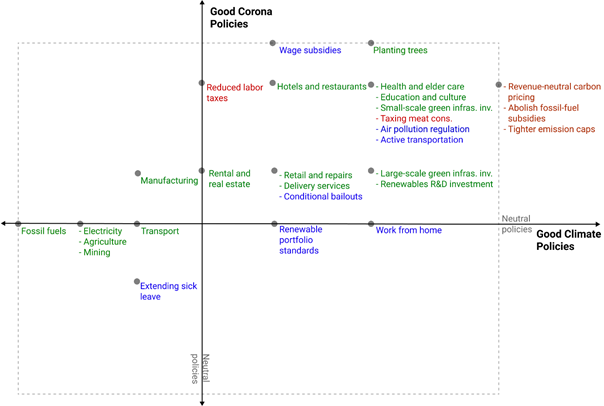
How to Combat the Corona-Recession and Climate Change
In a new research paper, the authors present measures that would be beneficial from both the pandemic and climate perspective.
This piece was first published in Svenska Dagbladet on July 25, 2020. It is reprinted with their permission.
During this spring the governments of many countries have launched stimulus packages to alleviate the economic crisis brought about by the corona pandemic. It has been argued that these large policy interventions present an opportunity to do things that also benefit the climate. Several policy suggestions have been put forward in the EU and in Sweden. There were similar ambitions for the stimulus following the financial crisis in 2009, but with very limited results. How can we prevent this from happening again? One problem is a lack of analysis showing which green investments actually alleviate the current economic crisis. The ambitions for the climate and the pandemic should not undermine each other.
So, what measures and instruments should we focus on? To find these we have, in a research paper, systematically analyzed the long term climate impacts of stimulus measures as well as the effects that classical climate-change mitigation policies would have on the current economic crisis.
We argue that to manage the economic consequences of the coronavirus, the main priority should be to avoid layoffs and unemployment. This will maintain demand in the economy and protect livelihoods and welfare. Consequently, our analysis has focused on layoffs and labor intensity in different economic sectors and industries. We used data on emission intensities to determine the climate effects of different activities. Furthermore, we have looked more closely at the extent to which the measures can be expected to have long run impacts. Our analysis is summarized in the figure:

These are our most important conclusions:
- Put a price on emissions and lower the tax on labor. According to our analysis, the most effective policy is to put a price on emissions of greenhouse gases and use the revenues to lower taxes on labor. Pricing emissions is generally considered the best climate policy. At the EU level, this can be implemented by decreasing the freely distributed emission permits and in Sweden by increasing the carbon tax. The generated revenues should be used to lower the labor tax, which is an excellent way to boost employment.,
- Make small-scale climate investments. Small-scale climate investment, such as insulation or putting solar panels on buildings, typically requires a lot of labor. Similarly, projects such as tree planting are likely cost-effective climate measures in the long run that creates lots of employment since trees absorb carbon dioxide over a long time and planting them requires lots of manual labor. While larger scale investments, such as solar and wind power farms, may be more cost efficient, they are typically less labor intense and thus contribute less to alleviate the current economic crisis. Similarly, we believe that investments in green R&D, while beneficial from a climate perspective, would not contribute much to the alleviating the current crisis since employment in the short to medium term is limited by the availability of people with the appropriate skills.
- Condition stimulus to economic sectors. If support is aimed at specific sectors, service sectors (leisure services such as restaurants and culture, or professional services such as technology) education and health care seem like the most promising alternatives due to high labor intensity and low emissions. We emphasize that sector specific support may be problematic. For example, support to travel-related sectors, such as hotels, indirectly supports aviation. While this business has been severely negatively affected by the crisis, aviation is not very labor intensive but extremely emissions intensive If support should be given to aviation, it must be coupled with stringent conditions that transforms it towards climate neutrality. Similarly, support should always be coupled with demands of increased employment.
- Other measures with long-run effects. Examples of other measures we would like to highlight include stricter regulation of air pollution in cities, and promotion of active modes of transportation such as biking and walking. They can bring long-lived investments towards climate neutrality and furthermore have long term health effects. They can also contribute to decreased sensitivity to the virus, or similar viruses, if the pandemic is prolonged or the corona virus becomes endemic.
- Do not support the oil and coal industries. Finally, it is extremely bad for from a climate perspective to try to save or help the oil and coal industries. It will also not alleviate the current economic crisis since these industries have low labor intensity. While this may seem obvious, it needs to be said since certain countries seem willing to support these industries.
There are, of course, other aspects that may affect the formulation of economic recovery policies. We argue, however, that thinking long term, strategically and creatively so that the stimulus packages also address one of the most pressing societal challenges – climate change – should be a main priority. Our analysis points to several such options. It is possible to find policies that fulfill both ambitions – alleviating the recession and steering the economy in a greener direction – without them undermining each other.
Arthur van Benthem
Associate Professor of Business Economics and Public PolicyArthur van Benthem is an expert in environmental and energy economics, exploring the economic efficiency of energy policy. He is a faculty fellow at the Kleinman Center and an associate professor of Business Economics and Public Policy at Wharton.
Gustav Engström
Researcher, Beijer InstituteGustav Engström is a researcher in economics at the Beijer Institute at the Royal Swedish Academy of Sciences.
Johan Gars
Researcher, Beijer InstituteJohan Gars is a researcher in economics at the Beijer Institute at the Royal Swedish Academy of Sciences.
Niko Jaakkola
Assistant Professor, University of Bologna in ItalyNiko Jaakkola is an assistant professor of economics at the University of Bologna in Italy.
Therese Lindahl
Researcher, Beijer InstituteTherese Lindahl is a researcher in economics at the Beijer Institute at the Royal Swedish Academy of Sciences, and the Stockholm Resilience Center at Stockholm University.
Daniel Spiro
Associate Professor, Uppsala UniversityDaniel Spiro is an associate professor of economics at Uppsala University.






